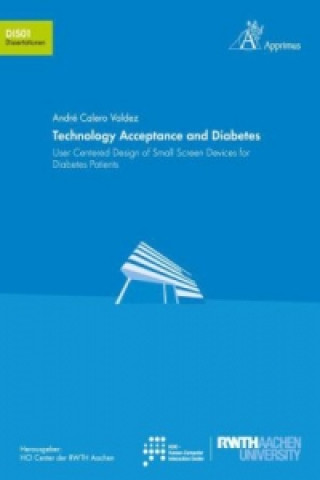
Kód: 06315323
Technology Acceptance and Diabetes
Autor André Calero Valdez
The present work deals with the user-centered design process and its impact on technology acceptance of small screen devices for diabetics. The aim of this interdisciplinary work is to conceptualize a compact diabetes management a ... celý popis
- Jazyk:
 Angličtina
Angličtina - Vazba: Brožovaná
- Počet stran: 422
Nakladatelství: Apprimus Verlag, 2014
- Více informací o knize

943 Kč
Dostupnost:
50 % šance Máme informaci, že by titul mohl být dostupný. Na základě vaší objednávky se ho pokusíme do 6 týdnů zajistit.
Máme informaci, že by titul mohl být dostupný. Na základě vaší objednávky se ho pokusíme do 6 týdnů zajistit.Prohledáme celý svět
Mohlo by se vám také líbit
Darujte tuto knihu ještě dnes
- Objednejte knihu a zvolte Zaslat jako dárek.
- Obratem obdržíte darovací poukaz na knihu, který můžete ihned předat obdarovanému.
- Knihu zašleme na adresu obdarovaného, o nic se nestaráte.
Informovat o naskladnění knihy
Zadejte do formuláře e-mailovou adresu a jakmile knihu naskladníme, zašleme vám o tom zprávu. Pohlídáme vše za vás.
Více informací o knize Technology Acceptance and Diabetes
Nákupem získáte 94 bodů
 Anotace knihy
Anotace knihy
The present work deals with the user-centered design process and its impact on technology acceptance of small screen devices for diabetics. The aim of this interdisciplinary work is to conceptualize a compact diabetes management assistant that meets the needs and requirements of its potential users. Moreover, a better understanding of the relationships of technical expertise, domain specificity, diversity and user acceptance should be obtained in relation to medical technology. Another research question deals with the purposeful endowment of acceptance: Can the usercentered design process, when it is accompanied by methods of technology acceptance research, systematically generate products that show more acceptability?§§Diabetes mellitus is a complex syndrome that puts health-care systems of all major industrial nations to the test. Diabetes cases worldwide are on the rise. The prevalence in Germany is estimated at 12%, roughly 10 million afflicted, with increasing incidence. Due to different causes (e.g. viral infections, genetic factors, obesity, poor diet, age, pregnancy), the body loses the ability to maintain its own energy-metabolism in homeostasis. Common to all cases of diabetes is a key symptom: insulin deficiency. To bring this regulatory circuit back into balance is the goal of diabetes therapy not always with hope for remission, but with hope of mitigation. The economic loss (i.e. treatment and secondary disorder treatment costs) of diabetes in Germany was estimated at about 40 billion euros in 2010, with 75% of it caused by secondary disorder treatment. In order to meet the necessarily required individuality of therapy, diabetics (or their doctors) need to monitor their vital parameters and accurately analyze the impact of food intake and medicine administration. This is done daily through detailed diary keeping.§§At this point, diabetes management assistants can be used. The digital logging of parameters and their programmatic interlinking can relieve some of the strain of the everyday activities of diabetics. Diabetes management assistants perform the necessary calculations, encode regular behavior simpler and indicate complications of therapy ahead of time and not only until the next doctors appointment. Since both bad diary keeping as well as insufficient device usage indicate high rejection rates and thus sadly lower compliance, there is an urgent need to develop user-centered solutions that help diabetics with their everyday needs.§§In this work, using user-centered methodology, requirements of the diabetes patients towards assistive devices are worked out and are contrasted with the properties of existing devices. For this purpose, in addition to a comprehensive market overview in devices for diabetics available in Germany, focus groups, interviews, questionnaire surveys, and user tests were carried out.§§In order to understand usage motives and barriers and their emergence, a questionnaire was conceptualized, created, and administered, which contains additional disease-related factors along with traditional factors of technology acceptance modeling. In order to ensure a holistic approach, factors from various technology acceptance models based on external validity were extracted and enriched with factors of user diversity (e.g. age, gender, education) and disease diversity (e.g. disease type, duration, therapy). In addition, personality characteristics such as coping strategies and psychometric aging scales were incorporated.§§The requirement analysis showed that users put special emphasis on ease of use, security certificates, as well as compact size and unobtrusiveness, when it comes to diabetes small-screen devices. Furthermore, such a device must be sensitive in dealing with user privacy and should not automatically forward data to the physician or healthcare professional. The perception of medical technology in general was found to be strongly dependent on the personal experience with using
 Parametry knihy
Parametry knihy
943 Kč
- Plný název: Technology Acceptance and Diabetes
- Podnázev: User-Centered Design of Small Screen Devices for Diabetes Patients
- Autor: André Calero Valdez
- Jazyk:
 Angličtina
Angličtina - Vazba: Brožovaná
- Počet stran: 422
- EAN: 9783863592394
- ISBN: 3863592395
- ID: 06315323
- Nakladatelství: Apprimus Verlag
- Hmotnost: 600 g
- Rozměry: 211 × 146 × 17 mm
- Datum vydání: 29. August 2014
Oblíbené z jiného soudku
-

Dune
216 Kč -

Haunting Adeline
621 Kč -

Berserk Deluxe Volume 2
1092 Kč -

White Nights
89 Kč -

Powerless
268 Kč -

Atomic Habits
330 Kč -

Dune Messiah
228 Kč -

Berserk Deluxe Volume 3
1142 Kč -

One Day
221 Kč -

Berserk Deluxe Volume 1
1115 Kč -

Iron Flame
368 Kč -

Surrounded by Idiots
213 Kč -

Harry Potter and the Prisoner of Azkaban (Minalima Edition)
993 Kč -

Gravity Falls Journal 3
443 Kč -

Heaven Official's Blessing: Tian Guan Ci Fu (Novel) Vol. 1
420 Kč -

The Creative Act
568 Kč -

Dune
276 Kč -

Hunting Adeline
624 Kč -

A Little Life
290 Kč -

Children of Dune
230 Kč -

Heaven Official's Blessing: Tian Guan Ci Fu (Novel) Vol. 2
427 Kč -

Bungo Stray Dogs, Vol. 8 (light novel)
383 Kč -

Percy Jackson and the Olympians 5 Book Paperback Boxed Set
944 Kč -

Solo Leveling, Vol. 1
440 Kč -

The Prisoner's Throne
247 Kč -

Court of Thorns and Roses
268 Kč -

Cry Baby Coloring Book
276 Kč -

Fourth Wing
407 Kč -

Icebreaker
199 Kč -

Berserk Deluxe Volume 6
1089 Kč -

Avatar, the Last Airbender: The Kyoshi Novels (Box Set)
986 Kč -

The 48 Laws of Power
608 Kč -

House of Leaves
611 Kč -

Twisted Lies
213 Kč -

Dune Messiah
272 Kč -

No Longer Human
359 Kč -

48 Laws Of Power
331 Kč -

Twisted Games
213 Kč -

Caraval Paperback Boxed Set
902 Kč -

Solo Leveling, Vol. 2
543 Kč -

Open Circuits
907 Kč -

Berserk Deluxe Volume 5
1119 Kč -

Heaven Official's Blessing: Tian Guan Ci Fu (Novel) Vol. 3
436 Kč -

Berserk Deluxe Volume 4
1125 Kč -

Court of Mist and Fury
206 Kč -

SOLO LEVELING V08
436 Kč -

English File Upper Intermediate Multipack A (4th)
531 Kč -

CHAINSAW MAN V14
254 Kč -

Before the Coffee Gets Cold
184 Kč
Osobní odběr Praha, Brno a 12903 dalších
Copyright ©2008-24 nejlevnejsi-knihy.cz Všechna práva vyhrazenaSoukromíCookies






 Vrácení do měsíce
Vrácení do měsíce 571 999 099 (8-15.30h)
571 999 099 (8-15.30h)